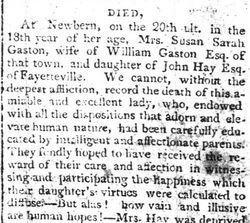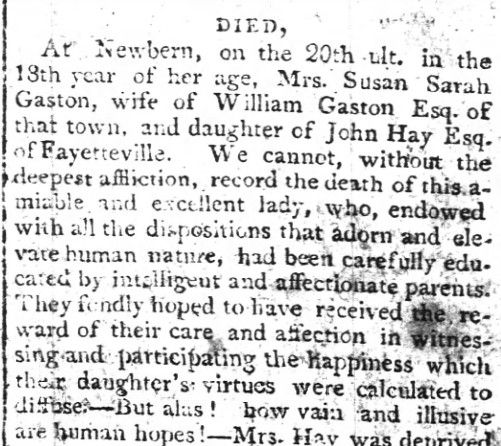While visiting his sister at Fayetteville [William Gaston] met Susan Hay, daughter of John Hay, a lawyer, and niece of William Barry Grove, one of the most prominent Federalists in North Carolina. Susan was the belle of the town, beautiful, lively, and the life of the younger set. Walter Troy, a student of Dr. William Hooper, exclaimed over her to his teacher, "Oh, Sir ! she is enough to melt the frigidity of a Stoic and excite rapture in the breast of a hermit."
Gaston visited his sister often that summer of 1803 and found Susan waiting there for him. At the end of the summer he wrote his sister that this period had been the most pleasant of his life, and that he felt Susan was better calculated to render him more happy than anyone he had ever met. "Residing under the same roof with my dear Susan and enjoying her confidence I have had an opportunity of a more intimate acquaintance of her excellencies. To say that I love her more though would not be true," he concluded. Susan was sixteen and William was twenty-five when they were married at Fayetteville on September 4, 1803.
The marriage seems to have taken place in the bride's home. The wedding over, the younger people rolled back the rugs in the large parlor and they danced and flirted and talked throughout the night, while the older and more sedate played cards and gossiped in other rooms. Outside the windows could be heard the soft murmur, the songs, and an occasional burst of laughter from the Negroes as they joined in the celebration. The couple took a short trip, and then returned to New Bern. Gaston began to gather the necessary material for the important Granville case and even to take in law students. The world looked bright for the young couple, but their happiness was of short duration, for on April 20, 1804, just eight months and sixteen days after the wedding, the young bride died.
Although the blow was hard, Gaston was young, and the companionship of young ladies was not unwelcome. Hence it was not surprising that a year and a half later the widower again sought the altar. His bride was a distant cousin, Hannah McClure, the daughter of General William McClure. Their friends, noticing the deepening intimacy, laughed at her for calling him "cousin."....They were married in New Bern on October 6, 1805, by Father Simon Felix Gallagher. The bride was nineteen, the groom twenty-seven.
—J. Herman Schauinger, The Domestic Life of William Gaston, Catholic Jurist (The Catholic Historical Review, Vol. XXX, January 1945)
DIED,
On Friday the 20th ultimo, in the eighteenth year of her age, Mrs. SUSAN SARAH GASTON, wife of William Gaston, Esq. of Newbern, and daughter of John Hay, Esq. of Fayetteville. We cannot, without the deepest affliction, record the death of this amiable and excellent lady, who endowed with all the dispositions that adorn and elevate human nature, had been carefully educated by intelligent and affectionate parents. They fondly hoped to have received the reward of their care and affection in witnessing and participating the happiness which their daughter's virtues were calculated to diffuse.—But alas ! how vain and illusive are human hopes—Mrs. Hay was deprived of life in October last, after a lingering and painful illness, and soon after the marriage of her daughter, who has been since gradually declining in a consumption, which resisted the most assiduous and anxious care of an affectionate husband, aided by the best medical advice—But all aid was ineffectual—her disease gradually increased with occasional intermissions, till she sunk under it, dying as she had lived, a patient, resigned, and suffering christian. With an highly improved and intelligent mind, she possessed the most amiable disposition. Her heart was gentle, her temper mild, & her manners soft and attractive. All who knew her must regret that so much worth and loveliness were doomed to so early a grave, yet her friends indulge the consoling hope that the maturity of her virtues fitted her for a higher and more durable state of existence.
—Minerva, or Anti-Jacobin, weekly newspaper (Raleigh, North Carolina), Monday, May 7, 1804, p. 3.
While visiting his sister at Fayetteville [William Gaston] met Susan Hay, daughter of John Hay, a lawyer, and niece of William Barry Grove, one of the most prominent Federalists in North Carolina. Susan was the belle of the town, beautiful, lively, and the life of the younger set. Walter Troy, a student of Dr. William Hooper, exclaimed over her to his teacher, "Oh, Sir ! she is enough to melt the frigidity of a Stoic and excite rapture in the breast of a hermit."
Gaston visited his sister often that summer of 1803 and found Susan waiting there for him. At the end of the summer he wrote his sister that this period had been the most pleasant of his life, and that he felt Susan was better calculated to render him more happy than anyone he had ever met. "Residing under the same roof with my dear Susan and enjoying her confidence I have had an opportunity of a more intimate acquaintance of her excellencies. To say that I love her more though would not be true," he concluded. Susan was sixteen and William was twenty-five when they were married at Fayetteville on September 4, 1803.
The marriage seems to have taken place in the bride's home. The wedding over, the younger people rolled back the rugs in the large parlor and they danced and flirted and talked throughout the night, while the older and more sedate played cards and gossiped in other rooms. Outside the windows could be heard the soft murmur, the songs, and an occasional burst of laughter from the Negroes as they joined in the celebration. The couple took a short trip, and then returned to New Bern. Gaston began to gather the necessary material for the important Granville case and even to take in law students. The world looked bright for the young couple, but their happiness was of short duration, for on April 20, 1804, just eight months and sixteen days after the wedding, the young bride died.
Although the blow was hard, Gaston was young, and the companionship of young ladies was not unwelcome. Hence it was not surprising that a year and a half later the widower again sought the altar. His bride was a distant cousin, Hannah McClure, the daughter of General William McClure. Their friends, noticing the deepening intimacy, laughed at her for calling him "cousin."....They were married in New Bern on October 6, 1805, by Father Simon Felix Gallagher. The bride was nineteen, the groom twenty-seven.
—J. Herman Schauinger, The Domestic Life of William Gaston, Catholic Jurist (The Catholic Historical Review, Vol. XXX, January 1945)
DIED,
On Friday the 20th ultimo, in the eighteenth year of her age, Mrs. SUSAN SARAH GASTON, wife of William Gaston, Esq. of Newbern, and daughter of John Hay, Esq. of Fayetteville. We cannot, without the deepest affliction, record the death of this amiable and excellent lady, who endowed with all the dispositions that adorn and elevate human nature, had been carefully educated by intelligent and affectionate parents. They fondly hoped to have received the reward of their care and affection in witnessing and participating the happiness which their daughter's virtues were calculated to diffuse.—But alas ! how vain and illusive are human hopes—Mrs. Hay was deprived of life in October last, after a lingering and painful illness, and soon after the marriage of her daughter, who has been since gradually declining in a consumption, which resisted the most assiduous and anxious care of an affectionate husband, aided by the best medical advice—But all aid was ineffectual—her disease gradually increased with occasional intermissions, till she sunk under it, dying as she had lived, a patient, resigned, and suffering christian. With an highly improved and intelligent mind, she possessed the most amiable disposition. Her heart was gentle, her temper mild, & her manners soft and attractive. All who knew her must regret that so much worth and loveliness were doomed to so early a grave, yet her friends indulge the consoling hope that the maturity of her virtues fitted her for a higher and more durable state of existence.
—Minerva, or Anti-Jacobin, weekly newspaper (Raleigh, North Carolina), Monday, May 7, 1804, p. 3.
Family Members
Advertisement
Explore more
Sponsored by Ancestry
Advertisement



